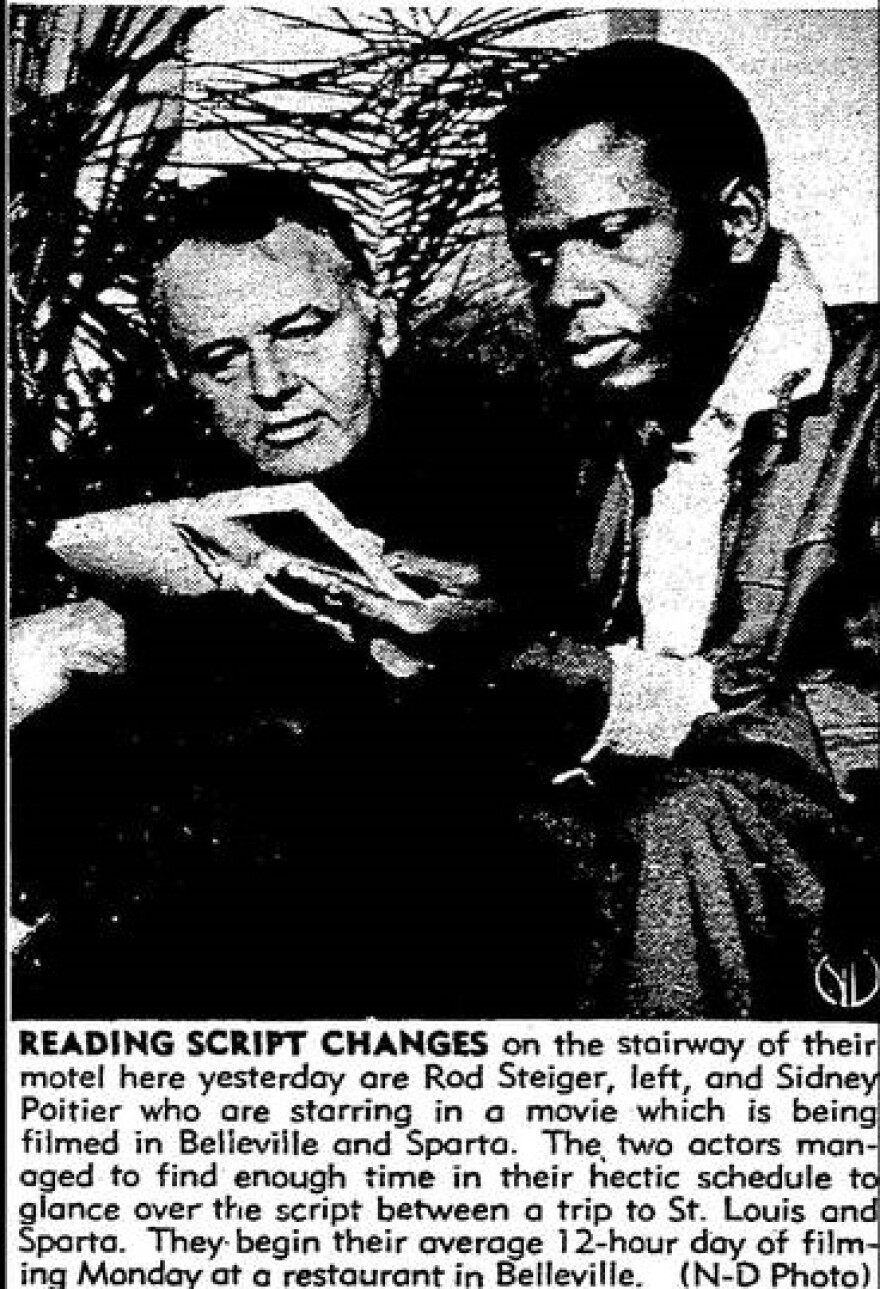Editor's note: This story was originally published in the Belleville News-Democrat.
When an advance team searched for a temporary southern Illinois home for stars Sidney Poitier and Rod Steiger during the filming of “In the Heat of the Night” in 1966, they landed on an iconic spot in Belleville.
It was Augustine’s Motor Lodge.
Poitier had already won an Academy Award for his role in the 1963 film “Lilies of the Field” and Steiger would go on to win an Oscar for his portrayal of Police Chief Bill Gillespie “In the Heat of the Night,” which was primarily filmed in Sparta.
The movie was released in 1967 and, to complement Steiger’s Academy Award, won four other Oscars, including best picture and screenplay.
The name of the Belleville hotel that hosted the two stars along with other members of the cast and crew was not publicized at the time for security reasons. But two Metro East women had a front-row view of the time Hollywood hit Belleville in the late summer and early fall 1966.
Pat Fischer was the office desk manager in at Augustine’s Motor Lodge, and Sarah Heil’s family had a membership at Augustine’s pool in 1966. She later worked on the front desk while she was in college.
Fischer and Heil are crestfallen about the plan to tear down the former motel at 1234 Centreville Ave. They wanted to spread the word about how nice the place was in its heyday and how Poitier, Steiger, and the rest of the “In the Heat of the Night” entourage enjoyed their stay in Belleville.
Hollywood stars
Long before the building fell into disrepair and was skewered in online reviews as the Executive Inn, it was a temporary home for two of Hollywood’s biggest stars in Poitier and Steiger.

“It was all exciting for me,” Fischer said of the stars’ visit to Belleville. “It was a very big deal.”
Along with his Academy Award for Best Actor for “Lilies of the Field,” Poitier also had been nominated for an Oscar for best actor for “The Defiant Ones” released in 1958.
Before arriving in Belleville, Steiger had received the best supporting actor nomination for 1954’s “On the Waterfront” and the best actor nomination for 1965’s “The Pawnbroker.”
Poitier liked jazz records and Steiger was arrogant, Fischer recalls.
“Sidney had a suite,” she said. “He wanted some music for his room.”
Fischer accommodated him with a coffee table stereo she brought from her home.
“Of course I was thrilled to loan it to him,” Fischer said. “He went down to the Record Bar in downtown Belleville and got a bunch of light jazz albums.
“When Sidney left, he gave me a plane ticket to New York to thank me for letting him use the stereo. He was the best guy ever.”
Fischer said Poitier thought it would be neat for her to “experience” the city where he was living at the time. But she was “poor” and cashed in the ticket instead of flying to the Big Apple.
“But I kept the letter that he wrote,” she said.
Fischer said the staff had their hands full in dealing with Steiger.
“Rod Steiger, he was the difficult one but he liked me,” she said. “He would only talk to me at the desk.”
Also, she said there was only one waitress at Augustine’s Restaurant that he would allow to serve him.
“He was a real pain in the butt,” Fischer said.
At the pool, he would saunter around in a Speedo swimsuit, “and he didn’t have a Speedo body, believe me,” Fischer said. “He was very, very arrogant but I liked him.”
Sparta site
Norman Jewison, the director of “In the Heat of the Night,” wanted to film the murder mystery in a Southern town as described in the novel on which the movie was based.
But Poitier, who was the first Black actor to win the Academy Award for Best Actor, refused to shoot a movie where he would be constrained by Jim Crow-era attitudes.
“I am not going to work in a city where I can’t move about, where I can’t eat if I want to,” Poitier told his biographer, according to an Answer Man column by Roger Schlueter in the BND in 2006.
Poitier was given the right to approve all shooting locales, the BND reported.
“Sidney wouldn’t go to the Deep South so they decided to do it up here,” Fischer said.
Jewison penned a column in 2017 for The Hollywood Reporter for the 50th anniversary of the release of the film. He wrote that he liked what he saw in Sparta and that it would work well as a Southern town for the movie.
When his production designer pointed out that all the “Sparta” signs would have to be changed to match the town in the novel, Jewison replied, “‘We’ll just make it Sparta, Mississippi. And that solves that problem.’ So that’s what we did. And we used that town as our main set piece.”
In the wake of that decision, the production team decided to base its operations at Augustine’s Motor Lodge in Belleville. The movie crew, except for its director, would commute from Belleville to Sparta. Jewison stayed in a home in Sparta.
Just as the racial tensions of the 1960s are reflected in Sparta being chosen as the site for the movie set, the movie’s story line also mirrored attitudes of the time.
In one scene, Steiger’s character, a white police chief named Bill Gillespie, insults the character played by Poitier, who had the role of Virgil Tibbs, a Black detective from Philadelphia.
Gillespie uses a racial epithet and denigrates Tibbs’ name in asking what people call him in Philadelphia.
Tibbs forcefully replies: “They call me Mister Tibbs!”
This line by Poitier is ranked No. 16 on a ranking of the top 100 movie quotes by the American Film Institute. AMI also places “In the Heat of the Night” at No. 75 on its ranking of the top 100 movies of all time.
Poitier, who had been friends with Steiger for several years before filming “In the Heat of the Night,” died a year ago at age 94. Steiger died in 2002 at age 77.
“We always said we were going to work together,” Steiger said during the film’s production, the BND reported.
Building demolition
Fischer and Heil both worked on the front desk in the motel in the 1960s and described it as the best place for Metro East visitors to stay, especially since it was next to the popular Augustine’s Restaurant.
“It was a very cool building,” Fischer said just as Heil echoed that exact description during an interview with the BND.
Both the motel and the restaurant were owned by late members of the Augustine family.
“It was a pleasant lobby. It was beautiful,” Heil said. It had a fireplace, a coffee shop, and cocktail lounge.
It also had what Heil called a “tunnel,” a carpeted, underground passageway that connected the motel’s lobby and the restaurant so guests could get to dinner without having to deal with bad weather.
“Whenever the Cubs were in town, the place was sold out because the Chicago people would drive to there and spend the weekend there and then go and see the Cardinal games,” Heil said.
Fischer said the liquor laws in Missouri also helped draw a crowd to Illinois.
“In those days, St. Louis was dry on Sunday,” she said. “That’s why on Sunday you couldn’t get near the place because everybody came over here.”
Fischer and Heil, both of Belleville, have been friends for the more-than 50 years since they met at Augustine’s.

They remember Ralph Augustine, who lived in a small house next to the motel and that he took great care of the property.
“Invariably, Ralph would come up out of the tunnel, and he’d have a whole dinner for me,” Heil said.
Fischer added, “He did that all the time.”
“They had this garlic cheese bread to die for,” Heil said. “They were known for that.”
Heil, 72, worked on the front desk on weekends while she was attending McKendree University beginning in 1968. Before that, her family had a membership to the heated, outdoor pool at the motel. She was 16 when she had the opportunity to watch movie stars at the Augustine’s pool.
Fischer, 80, was married to the late David Fischer, a member of the family that ran the former Fischer’s Restaurant in Belleville. She started out on the desk around 1963 and was then promoted to be desk manager. Heil fondly recalls Fischer was “my boss.”
Augustine’s Restaurant opened in 1956 and the motel was established in 1962. The restaurant building at 1200 Centreville Ave. is not part of the demolition project.

Heil and Fischer both left Augustine’s before it became a Ramada Inn in 1973. It was rebranded the Executive Inn in 1979.
The Belleville City Council has voted to spend $730,000 in federal COVID relief money to pay for the demolition of the former motel near the intersection of Illinois 15 and Illinois 158. The decision was made after the city had sued the current owners in 2020 because of the poor condition of the building.
In fact, the state of the hotel garnered national attention thanks to the colorful warnings posted by patrons in online review sites. One person on TripAdvisor even wrote “If you would like to die, stay here!”
Heil, whose husband is acclaimed sound and radio engineer Bob Heil, said the quality of the motel dropped after the late Ralph Augustine stopped running it.
“Trust me, it just really went downhill the minute the Augustines were gone,” Heil said.

Mike Koziatek is a reporter with the Belleville News-Democrat, a news partner of St. Louis Public Radio.





